
emohaa-free-api
🚀 聆心智能 Emohaa情感陪伴大模型逆向API白嫖测试【特长:共情能力】,支持高速流式输出、多轮对话,零配置部署,多路token支持,自动清理会话痕迹。
Stars: 77
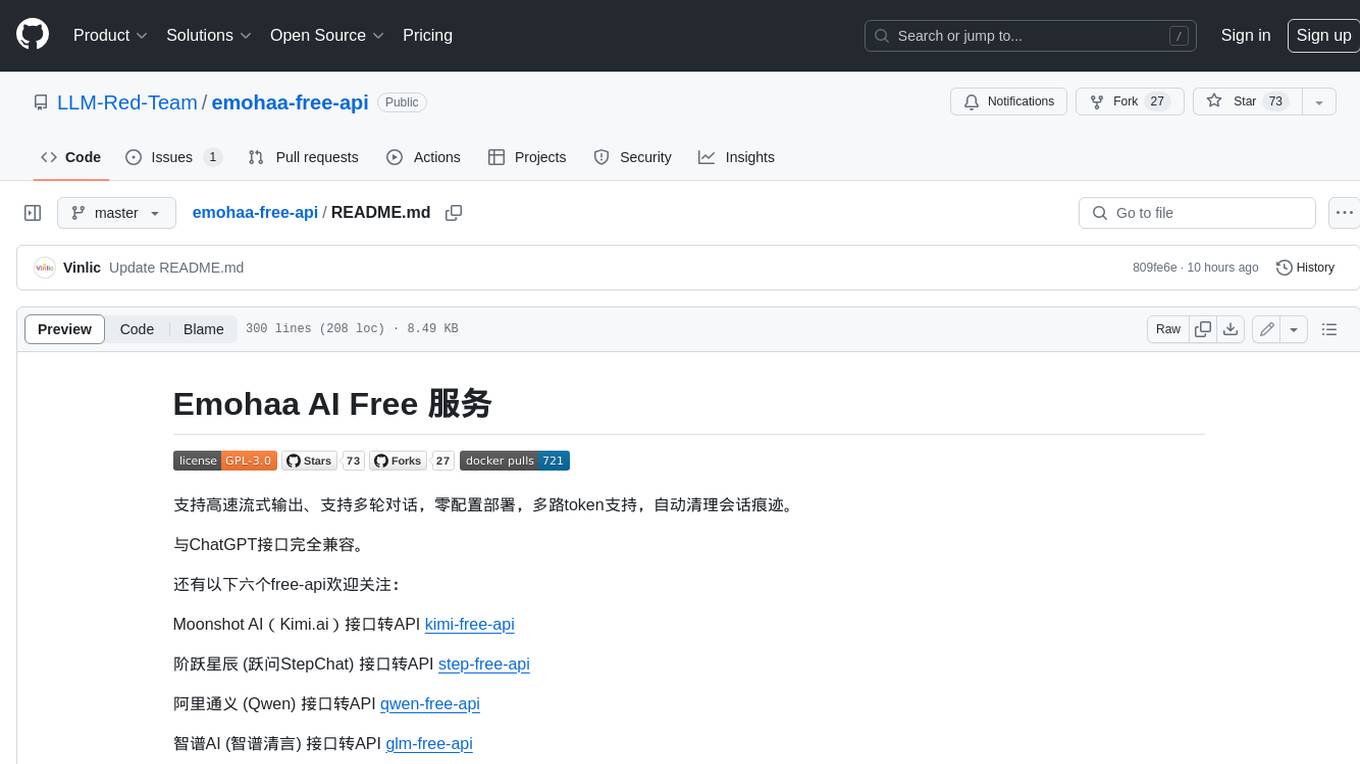
Emohaa AI Free API is a free API that allows you to access the Emohaa AI chatbot. Emohaa AI is a powerful chatbot that can understand and respond to a wide range of natural language queries. It can be used for a variety of purposes, such as customer service, information retrieval, and language translation. The Emohaa AI Free API is easy to use and can be integrated into any application. It is a great way to add AI capabilities to your projects without having to build your own chatbot from scratch.
README:
支持高速流式输出、支持多轮对话,零配置部署,多路token支持,自动清理会话痕迹。
与ChatGPT接口完全兼容。
还有以下七个free-api欢迎关注:
Moonshot AI(Kimi.ai)接口转API kimi-free-api
阶跃星辰 (跃问StepChat) 接口转API step-free-api
阿里通义 (Qwen) 接口转API qwen-free-api
智谱AI (智谱清言) 接口转API glm-free-api
秘塔AI (Metaso) 接口转API metaso-free-api
讯飞星火(Spark)接口转API spark-free-api
MiniMax(海螺AI)接口转API hailuo-free-api
逆向API是不稳定的,建议前往聆心智能官方 https://www.ai-beings.com/ 付费使用API,避免封禁的风险。
本组织和个人不接受任何资金捐助和交易,此项目是纯粹研究交流学习性质!
仅限自用,禁止对外提供服务或商用,避免对官方造成服务压力,否则风险自担!
仅限自用,禁止对外提供服务或商用,避免对官方造成服务压力,否则风险自担!
仅限自用,禁止对外提供服务或商用,避免对官方造成服务压力,否则风险自担!
此链接仅临时测试功能,不可长期使用,长期使用请自行部署。
https://udify.app/chat/LDgsbVTfyTQ000Oq
从 echo.turing-world.com 获取token
登录进入,由于emohaa禁用F12开发者工具,请先安装 Manage LocalStorage 插件,再从在当前页面中打开插件并点击 Export 按钮找到Token的值,这将作为Authorization的Bearer Token值:Authorization: Bearer TOKEN
你可以通过提供多个账号的token并使用,拼接提供:
Authorization: Bearer TOKEN1,TOKEN2,TOKEN3
每次请求服务会从中挑选一个。
请准备一台具有公网IP的服务器并将8000端口开放。
拉取镜像并启动服务
docker run -it -d --init --name emohaa-free-api -p 8000:8000 -e TZ=Asia/Shanghai vinlic/emohaa-free-api:latest查看服务实时日志
docker logs -f emohaa-free-api重启服务
docker restart emohaa-free-api停止服务
docker stop emohaa-free-apiversion: '3'
services:
emohaa-free-api:
container_name: emohaa-free-api
image: vinlic/emohaa-free-api:latest
restart: always
ports:
- "8000:8000"
environment:
- TZ=Asia/Shanghai注意:部分部署区域可能无法连接emohaa,如容器日志出现请求超时或无法连接,请切换其他区域部署! 注意:免费账户的容器实例将在一段时间不活动时自动停止运行,这会导致下次请求时遇到50秒或更长的延迟,建议查看Render容器保活
-
fork本项目到你的github账号下。
-
访问 Render 并登录你的github账号。
-
构建你的 Web Service(New+ -> Build and deploy from a Git repository -> Connect你fork的项目 -> 选择部署区域 -> 选择实例类型为Free -> Create Web Service)。
-
等待构建完成后,复制分配的域名并拼接URL访问即可。
注意:Vercel免费账户的请求响应超时时间为10秒,但接口响应通常较久,可能会遇到Vercel返回的504超时错误!
请先确保安装了Node.js环境。
npm i -g vercel --registry http://registry.npmmirror.com
vercel login
git clone https://github.com/LLM-Red-Team/emohaa-free-api
cd emohaa-free-api
vercel --prod请准备一台具有公网IP的服务器并将8000端口开放。
请先安装好Node.js环境并且配置好环境变量,确认node命令可用。
安装依赖
npm i安装PM2进行进程守护
npm i -g pm2编译构建,看到dist目录就是构建完成
npm run build启动服务
pm2 start dist/index.js --name "emohaa-free-api"查看服务实时日志
pm2 logs emohaa-free-api重启服务
pm2 reload emohaa-free-api停止服务
pm2 stop emohaa-free-api使用以下二次开发客户端接入free-api系列项目更快更简单,支持文档/图像上传!
由 Clivia 二次开发的LobeChat https://github.com/Yanyutin753/lobe-chat
由 时光@ 二次开发的ChatGPT Web https://github.com/SuYxh/chatgpt-web-sea
目前支持与openai兼容的 /v1/chat/completions 接口,可自行使用与openai或其他兼容的客户端接入接口,或者使用 dify 等线上服务接入使用。
对话补全接口,与openai的 chat-completions-api 兼容。
POST /v1/chat/completions
header 需要设置 Authorization 头部:
Authorization: Bearer [refresh_token]
请求数据:
{
"messages": [
{
"role": "user",
"content": "你好"
}
],
// 如果使用SSE流请设置为true,默认false
"stream": false
}响应数据:
{
"id": "f73f02e6-6b43-4a46-ac24-3a9ea8d15145",
"model": "emohaa",
"object": "chat.completion",
"choices": [
{
"index": 0,
"message": {
"role": "assistant",
"content": " 你好啊!我是Emohaa,想和我聊点什么吗? 今天心情如何?"
},
"finish_reason": "stop"
}
],
"usage": {
"prompt_tokens": 1,
"completion_tokens": 1,
"total_tokens": 2
},
"created": 1710603111
}检测token是否存活,如果存活live未true,否则为false,请不要频繁(小于10分钟)调用此接口。
POST /token/check
请求数据:
{
"token": "eyJhbGciOiJIUzUxMiIsInR5cCI6IkpXVCJ9..."
}响应数据:
{
"live": true
}如果您正在使用Nginx反向代理kimi-free-api,请添加以下配置项优化流的输出效果,优化体验感。
# 关闭代理缓冲。当设置为off时,Nginx会立即将客户端请求发送到后端服务器,并立即将从后端服务器接收到的响应发送回客户端。
proxy_buffering off;
# 启用分块传输编码。分块传输编码允许服务器为动态生成的内容分块发送数据,而不需要预先知道内容的大小。
chunked_transfer_encoding on;
# 开启TCP_NOPUSH,这告诉Nginx在数据包发送到客户端之前,尽可能地发送数据。这通常在sendfile使用时配合使用,可以提高网络效率。
tcp_nopush on;
# 开启TCP_NODELAY,这告诉Nginx不延迟发送数据,立即发送小数据包。在某些情况下,这可以减少网络的延迟。
tcp_nodelay on;
# 设置保持连接的超时时间,这里设置为120秒。如果在这段时间内,客户端和服务器之间没有进一步的通信,连接将被关闭。
keepalive_timeout 120;由于推理侧不再kimi-free-api,因此token不可统计,将以固定数字返回。
For Tasks:
Click tags to check more tools for each tasksFor Jobs:
Alternative AI tools for emohaa-free-api
Similar Open Source Tools

emohaa-free-api
Emohaa AI Free API is a free API that allows you to access the Emohaa AI chatbot. Emohaa AI is a powerful chatbot that can understand and respond to a wide range of natural language queries. It can be used for a variety of purposes, such as customer service, information retrieval, and language translation. The Emohaa AI Free API is easy to use and can be integrated into any application. It is a great way to add AI capabilities to your projects without having to build your own chatbot from scratch.
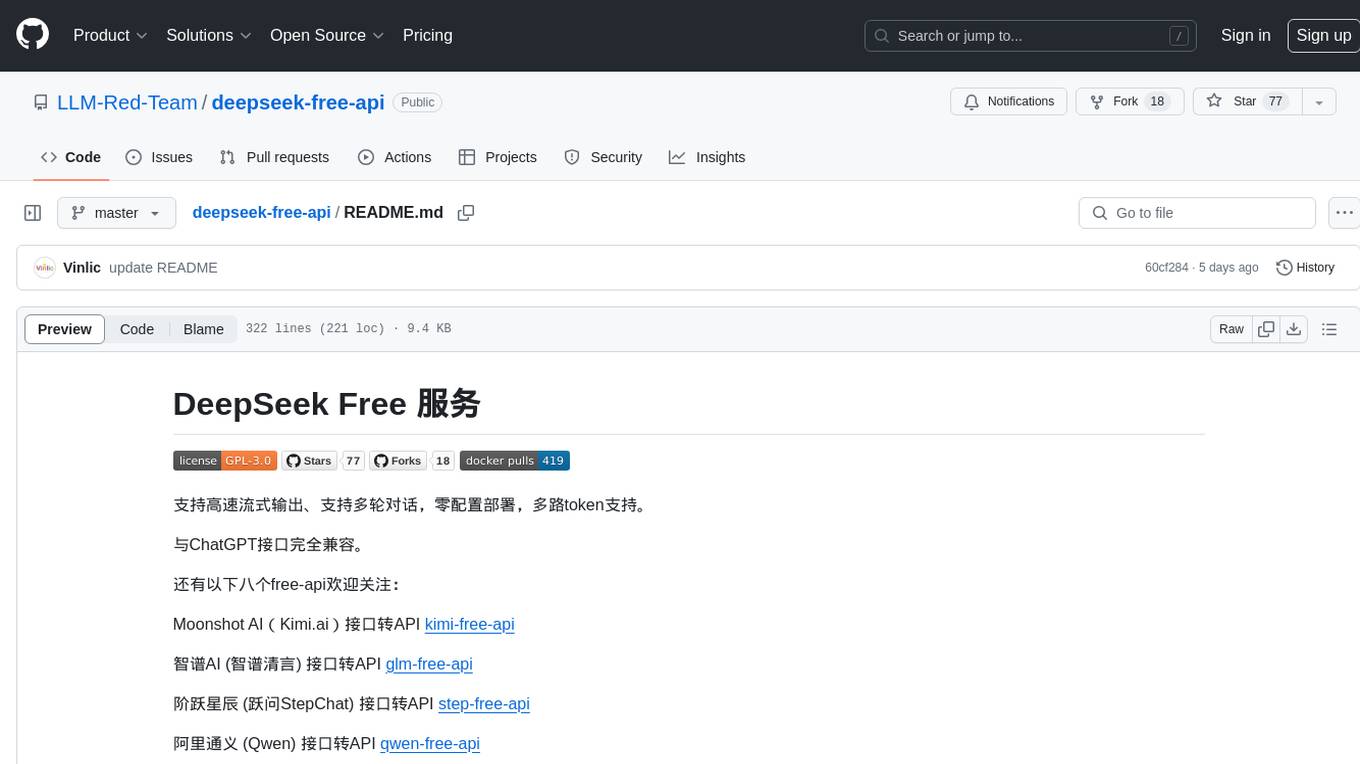
deepseek-free-api
DeepSeek Free API is a high-speed streaming output tool that supports multi-turn conversations and zero-configuration deployment. It is compatible with the ChatGPT interface and offers multiple token support. The tool provides eight free APIs for various AI interfaces. Users can access the tool online, prepare for integration, deploy using Docker, Docker-compose, Render, Vercel, or native deployment methods. It also offers client recommendations for faster integration and supports dialogue completion and userToken live checks. The tool comes with important considerations for Nginx reverse proxy optimization and token statistics.
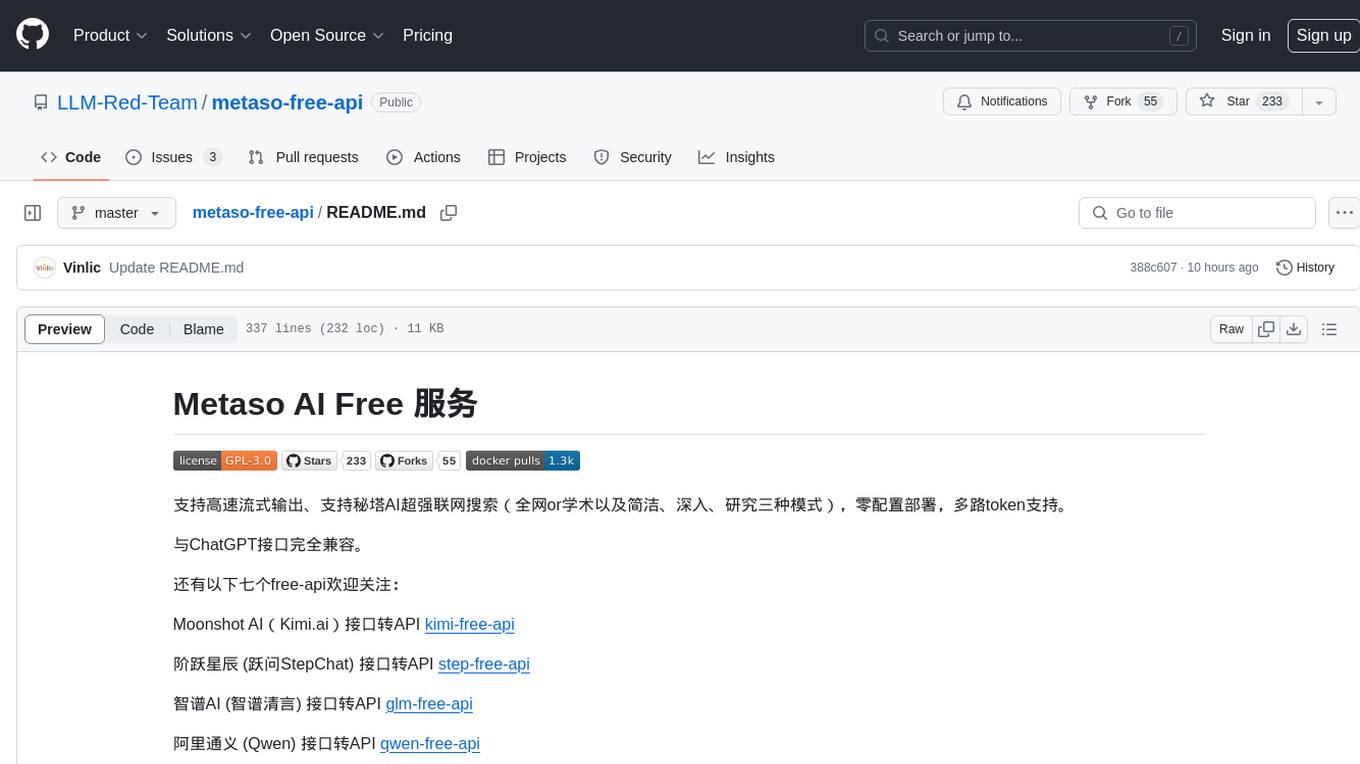
metaso-free-api
Metaso AI Free service supports high-speed streaming output, secret tower AI super network search (full network or academic as well as concise, in-depth, research three modes), zero-configuration deployment, multi-token support. Fully compatible with ChatGPT interface. It also has seven other free APIs available for use. The tool provides various deployment options such as Docker, Docker-compose, Render, Vercel, and native deployment. Users can access the tool for chat completions and token live checks. Note: Reverse API is unstable, it is recommended to use the official Metaso AI website to avoid the risk of banning. This project is for research and learning purposes only, not for commercial use.
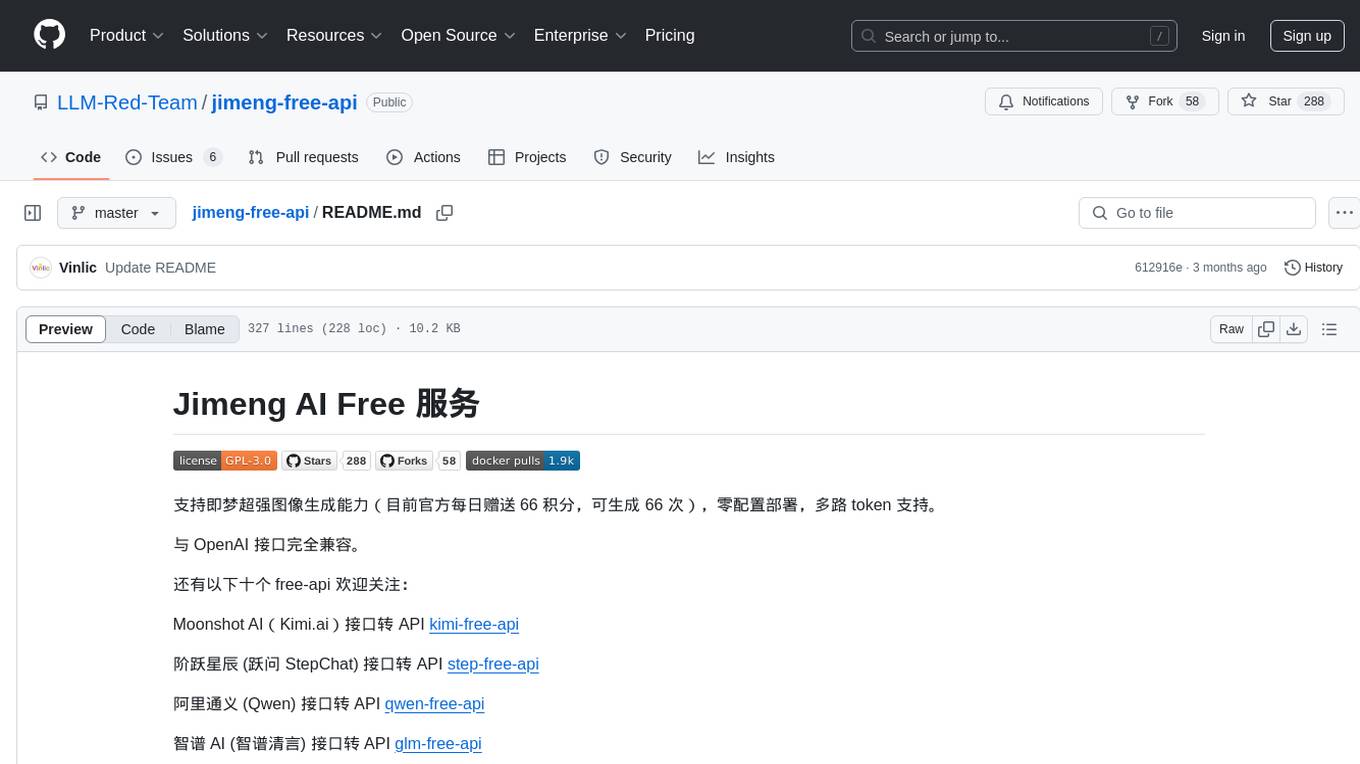
jimeng-free-api
Jimeng AI Free service provides powerful image generation capabilities with zero configuration deployment and support for multiple tokens. It is fully compatible with the OpenAI interface. The repository also includes other free APIs like Moonshot AI, StepChat, Qwen, GLM AI, Metaso AI, Doubao by ByteDance, Spark by Xunfei, Hailuo AI, DeepSeek, and Emohaa AI. Users can access the service by obtaining a sessionid from Jimeng and using it as a Bearer Token in the Authorization header for API requests. The service supports chat completions and image generations, with different models and parameters available for customization. Various deployment options are provided, including Docker, Docker-compose, Render, Vercel, and native deployment. Users are advised to use the recommended client applications for faster and simpler access to the free API services.
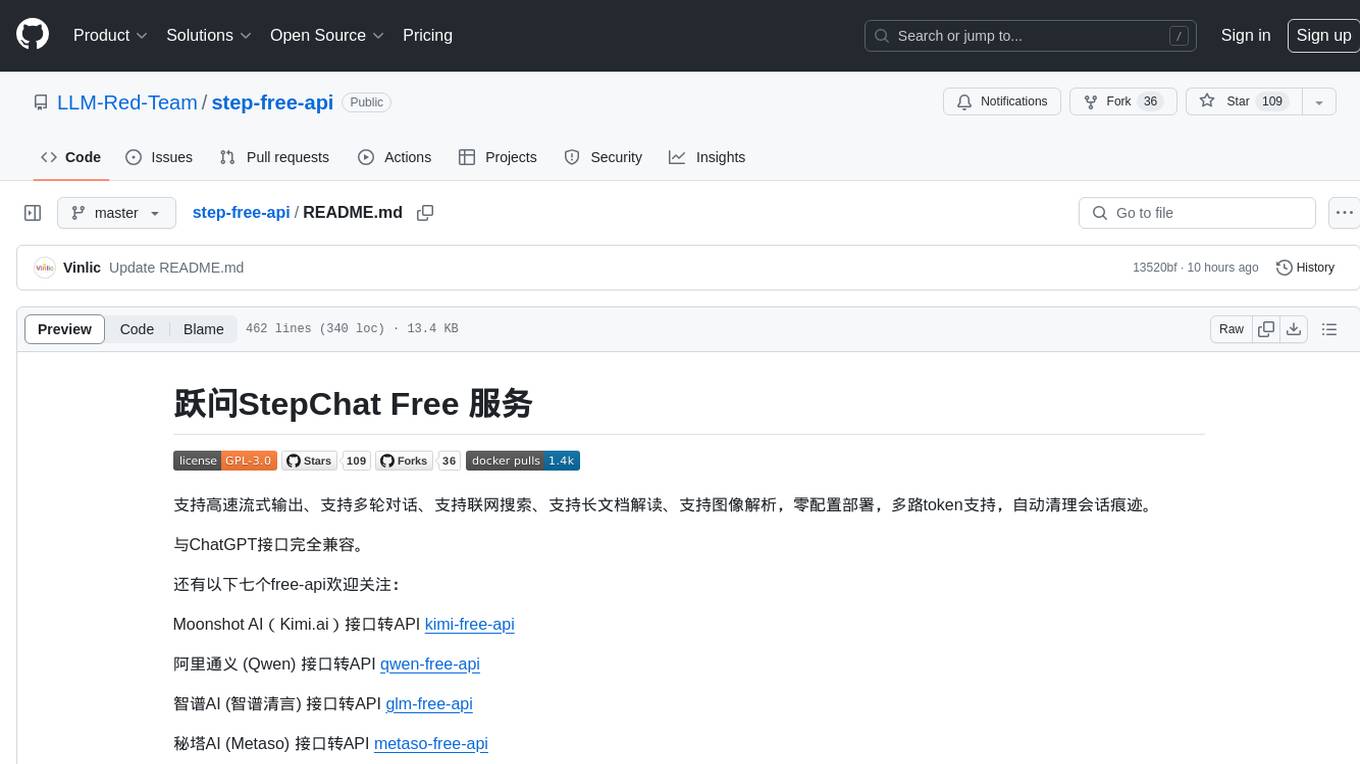
step-free-api
The StepChat Free service provides high-speed streaming output, multi-turn dialogue support, online search support, long document interpretation, and image parsing. It offers zero-configuration deployment, multi-token support, and automatic session trace cleaning. It is fully compatible with the ChatGPT interface. Additionally, it provides seven other free APIs for various services. The repository includes a disclaimer about using reverse APIs and encourages users to avoid commercial use to prevent service pressure on the official platform. It offers online testing links, showcases different demos, and provides deployment guides for Docker, Docker-compose, Render, Vercel, and native deployments. The repository also includes information on using multiple accounts, optimizing Nginx reverse proxy, and checking the liveliness of refresh tokens.
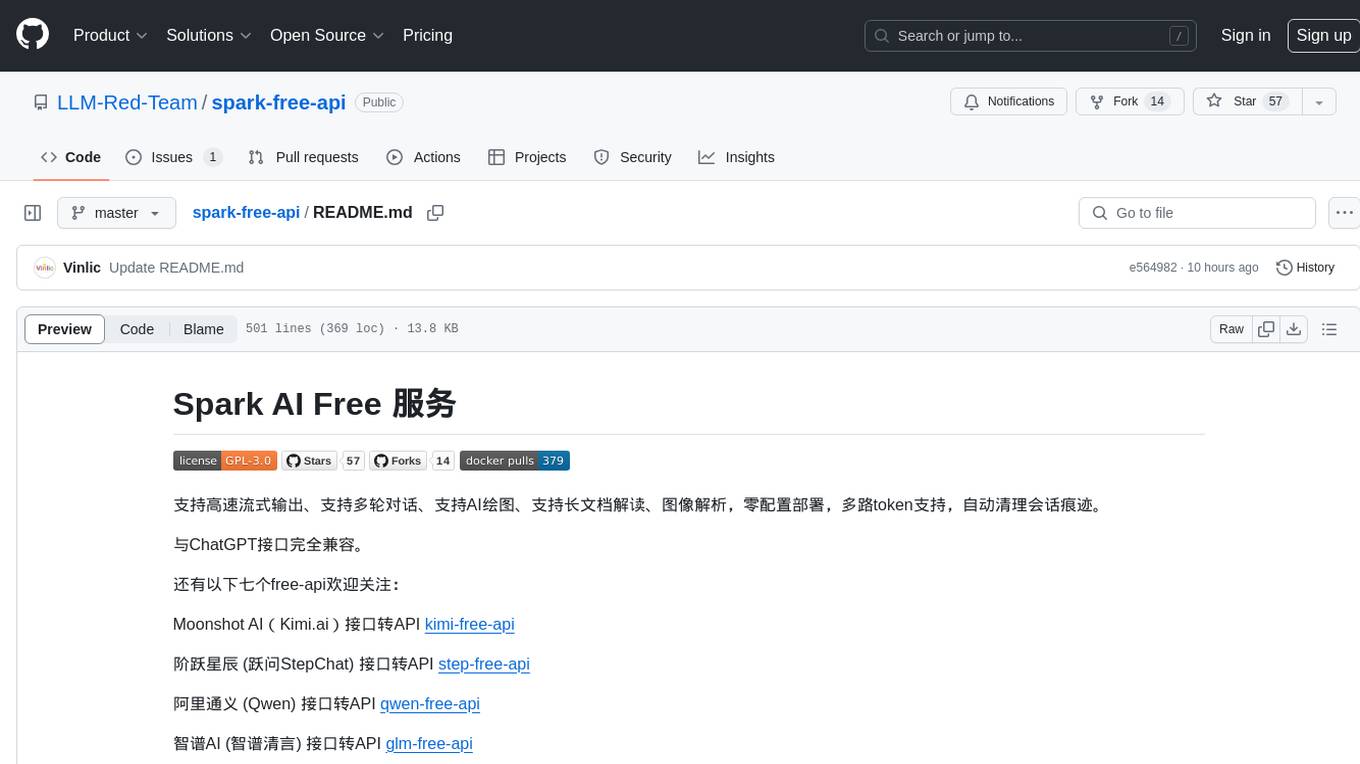
spark-free-api
Spark AI Free 服务 provides high-speed streaming output, multi-turn dialogue support, AI drawing support, long document interpretation, and image parsing. It offers zero-configuration deployment, multi-token support, and automatic session trace cleaning. It is fully compatible with the ChatGPT interface. The repository includes multiple free-api projects for various AI services. Users can access the API for tasks such as chat completions, AI drawing, document interpretation, image analysis, and ssoSessionId live checking. The project also provides guidelines for deployment using Docker, Docker-compose, Render, Vercel, and native deployment methods. It recommends using custom clients for faster and simpler access to the free-api series projects.
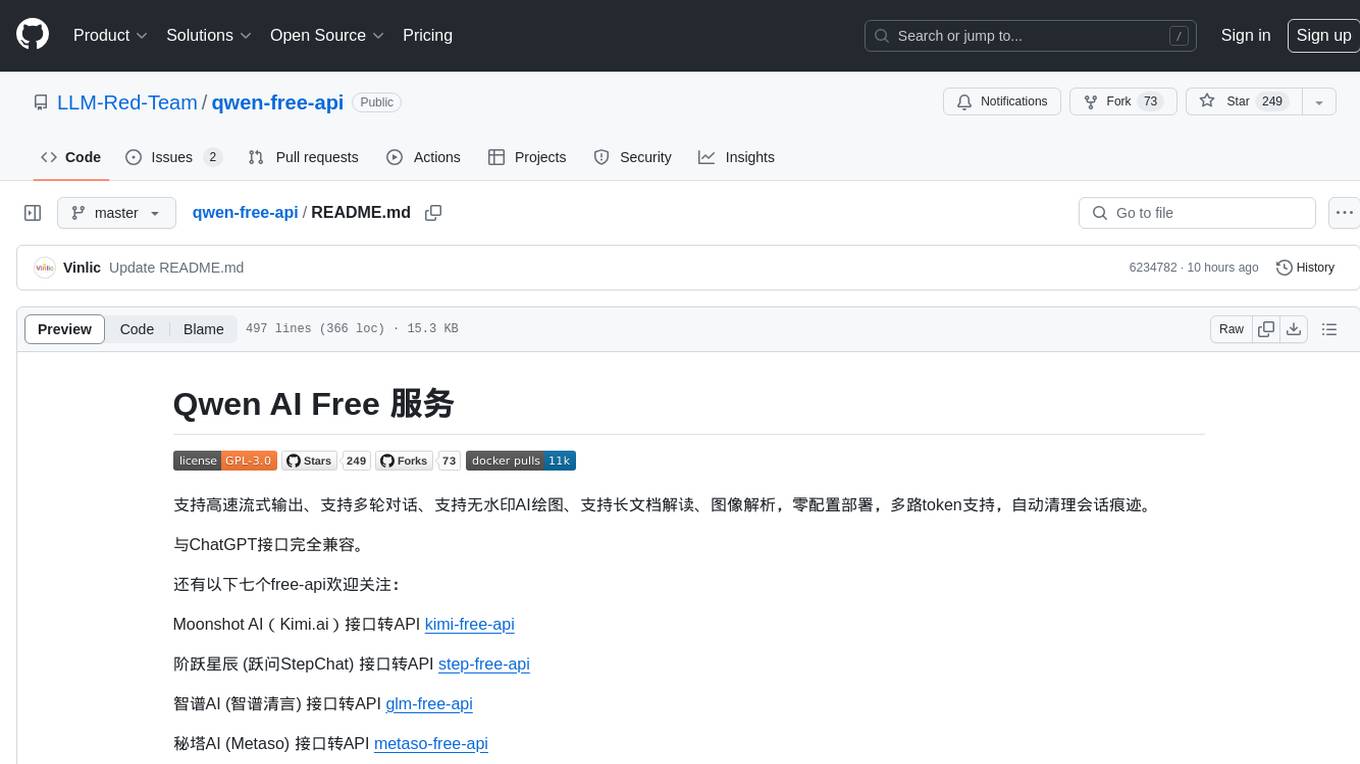
qwen-free-api
Qwen AI Free service supports high-speed streaming output, multi-turn dialogue, watermark-free AI drawing, long document interpretation, image parsing, zero-configuration deployment, multi-token support, automatic session trace cleaning. It is fully compatible with the ChatGPT interface. The repository provides various free APIs for different AI services. Users can access the service through different deployment methods like Docker, Docker-compose, Render, Vercel, and native deployment. It offers interfaces for chat completions, AI drawing, document interpretation, image parsing, and token checking. Users need to provide 'login_tongyi_ticket' for authorization. The project emphasizes research, learning, and personal use only, discouraging commercial use to avoid service pressure on the official platform.
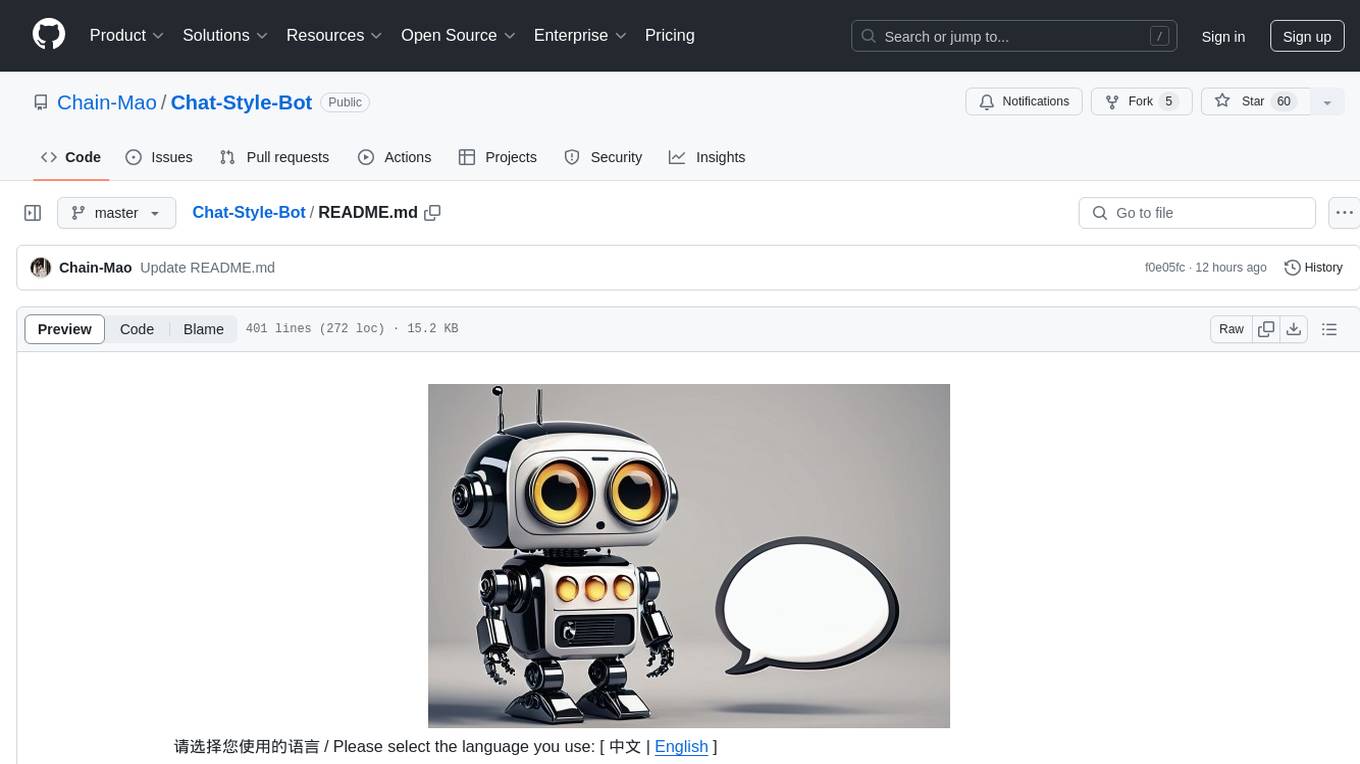
Chat-Style-Bot
Chat-Style-Bot is an intelligent chatbot designed to mimic the chatting style of a specified individual. By analyzing and learning from WeChat chat records, Chat-Style-Bot can imitate your unique chatting style and become your personal chat assistant. Whether it's communicating with friends or handling daily conversations, Chat-Style-Bot can provide a natural, personalized interactive experience.
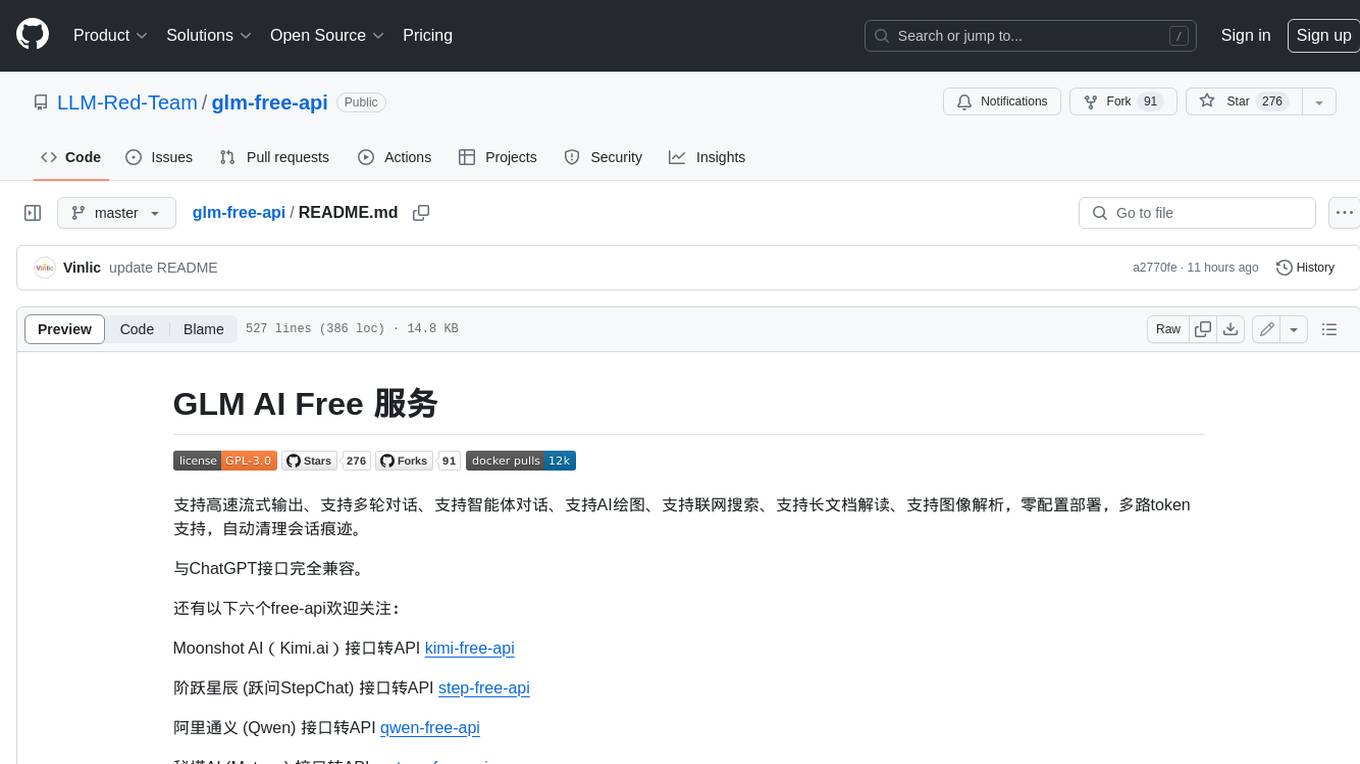
glm-free-api
GLM AI Free 服务 provides high-speed streaming output, multi-turn dialogue support, intelligent agent dialogue support, AI drawing support, online search support, long document interpretation support, image parsing support. It offers zero-configuration deployment, multi-token support, and automatic session trace cleaning. It is fully compatible with the ChatGPT interface. The repository also includes six other free APIs for various services like Moonshot AI, StepChat, Qwen, Metaso, Spark, and Emohaa. The tool supports tasks such as chat completions, AI drawing, document interpretation, image parsing, and refresh token survival check.
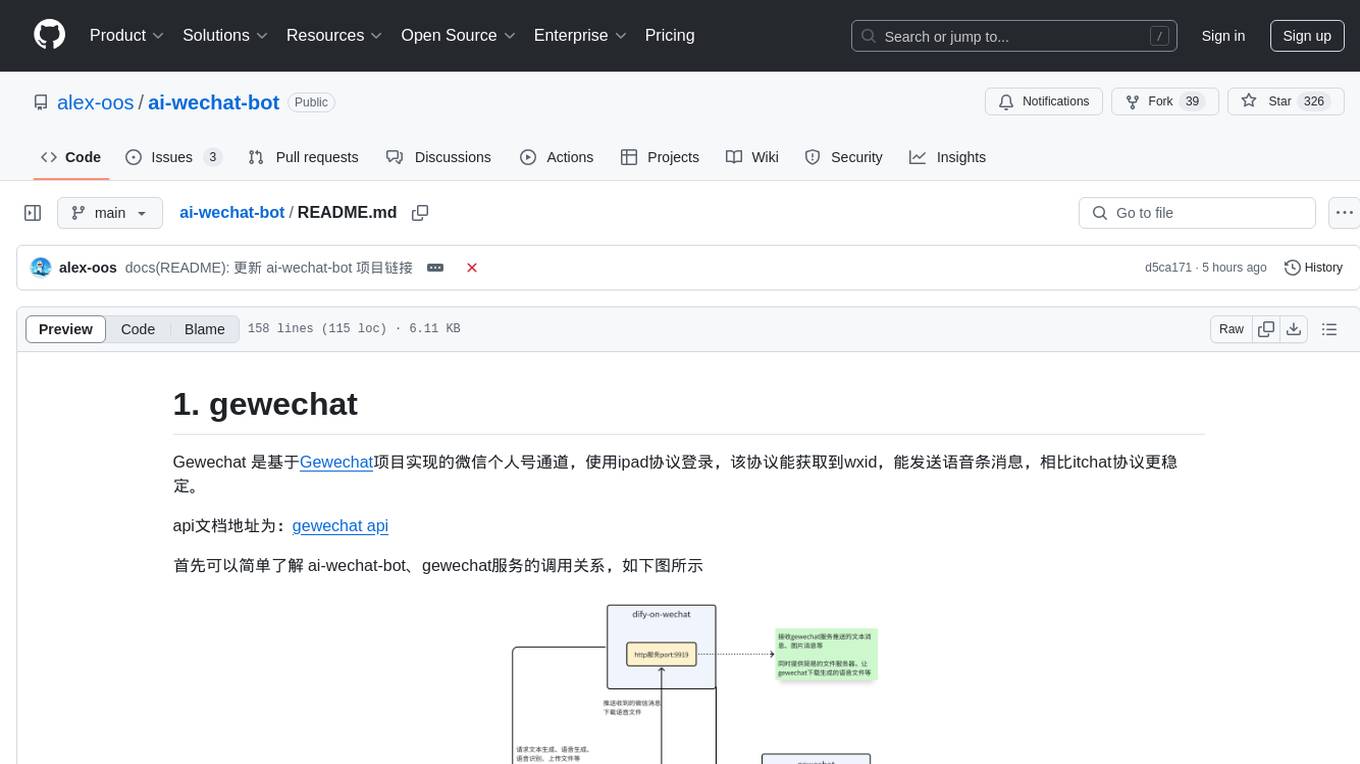
ai-wechat-bot
Gewechat is a project based on the Gewechat project to implement a personal WeChat channel, using the iPad protocol for login. It can obtain wxid and send voice messages, which is more stable than the itchat protocol. The project provides documentation for the API. Users can deploy the Gewechat service and use the ai-wechat-bot project to interface with it. Configuration parameters for Gewechat and ai-wechat-bot need to be set in the config.json file. Gewechat supports sending voice messages, with limitations on the duration of received voice messages. The project has restrictions such as requiring the server to be in the same province as the device logging into WeChat, limited file download support, and support only for text and image messages.
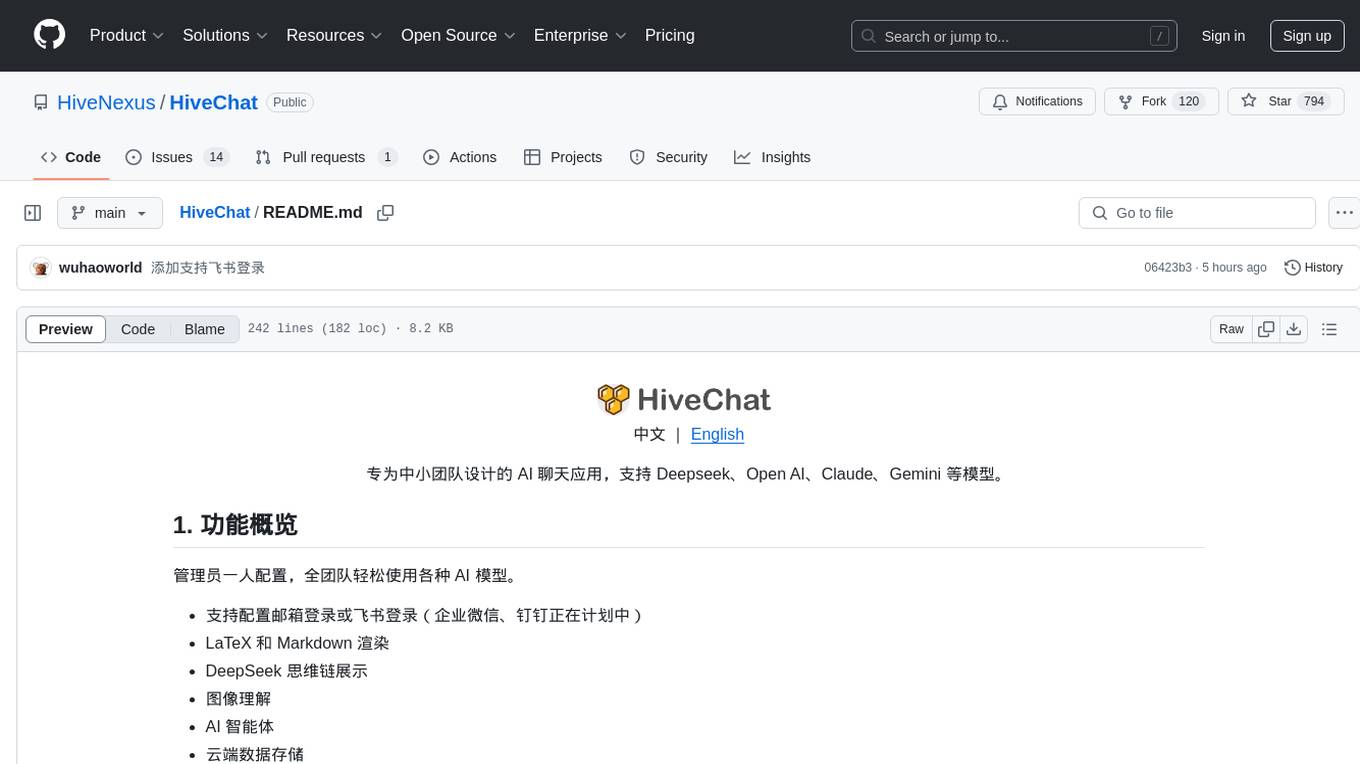
HiveChat
HiveChat is an AI chat application designed for small and medium teams. It supports various models such as DeepSeek, Open AI, Claude, and Gemini. The tool allows easy configuration by one administrator for the entire team to use different AI models. It supports features like email or Feishu login, LaTeX and Markdown rendering, DeepSeek mind map display, image understanding, AI agents, cloud data storage, and integration with multiple large model service providers. Users can engage in conversations by logging in, while administrators can configure AI service providers, manage users, and control account registration. The technology stack includes Next.js, Tailwindcss, Auth.js, PostgreSQL, Drizzle ORM, and Ant Design.
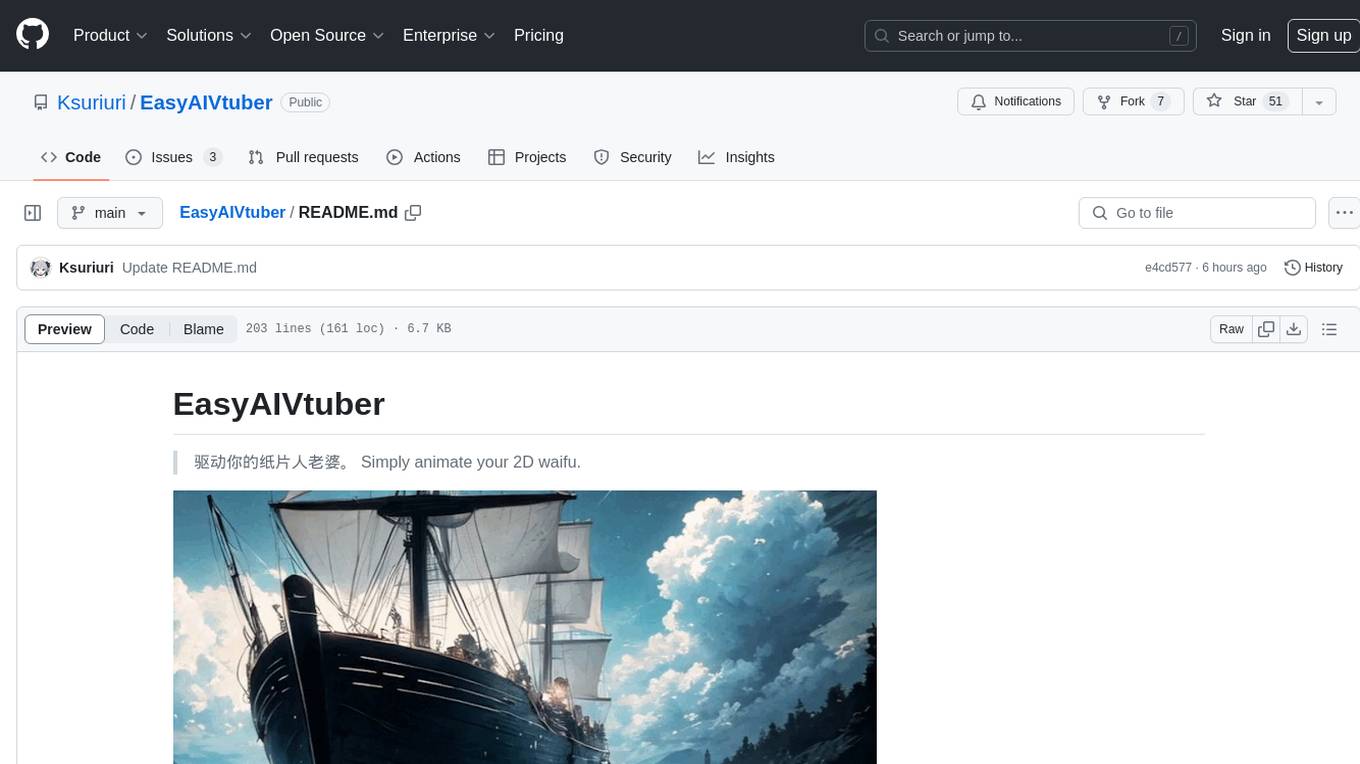
EasyAIVtuber
EasyAIVtuber is a tool designed to animate 2D waifus by providing features like automatic idle actions, speaking animations, head nodding, singing animations, and sleeping mode. It also offers API endpoints and a web UI for interaction. The tool requires dependencies like torch and pre-trained models for optimal performance. Users can easily test the tool using OBS and UnityCapture, with options to customize character input, output size, simplification level, webcam output, model selection, port configuration, sleep interval, and movement extension. The tool also provides an API using Flask for actions like speaking based on audio, rhythmic movements, singing based on music and voice, stopping current actions, and changing images.
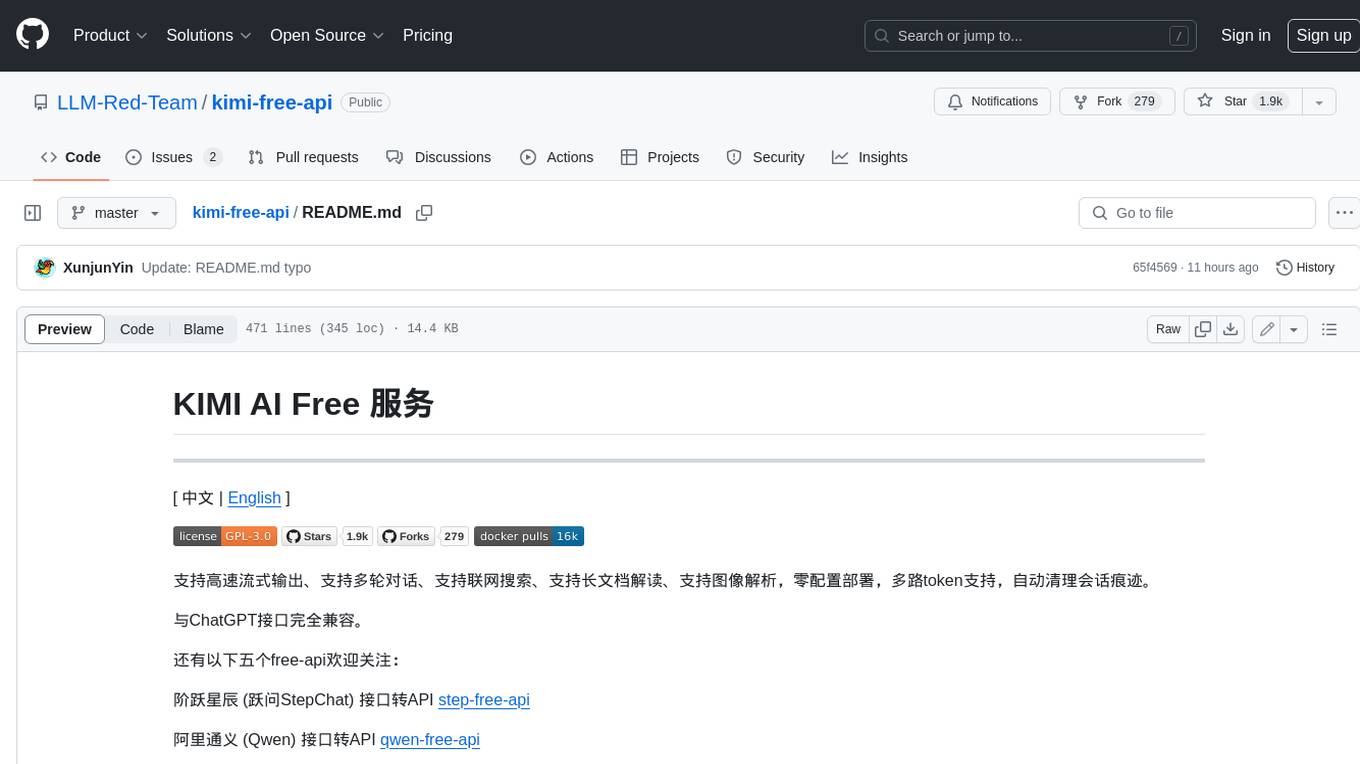
kimi-free-api
KIMI AI Free 服务 支持高速流式输出、支持多轮对话、支持联网搜索、支持长文档解读、支持图像解析,零配置部署,多路token支持,自动清理会话痕迹。 与ChatGPT接口完全兼容。 还有以下五个free-api欢迎关注: 阶跃星辰 (跃问StepChat) 接口转API step-free-api 阿里通义 (Qwen) 接口转API qwen-free-api ZhipuAI (智谱清言) 接口转API glm-free-api 秘塔AI (metaso) 接口转API metaso-free-api 聆心智能 (Emohaa) 接口转API emohaa-free-api
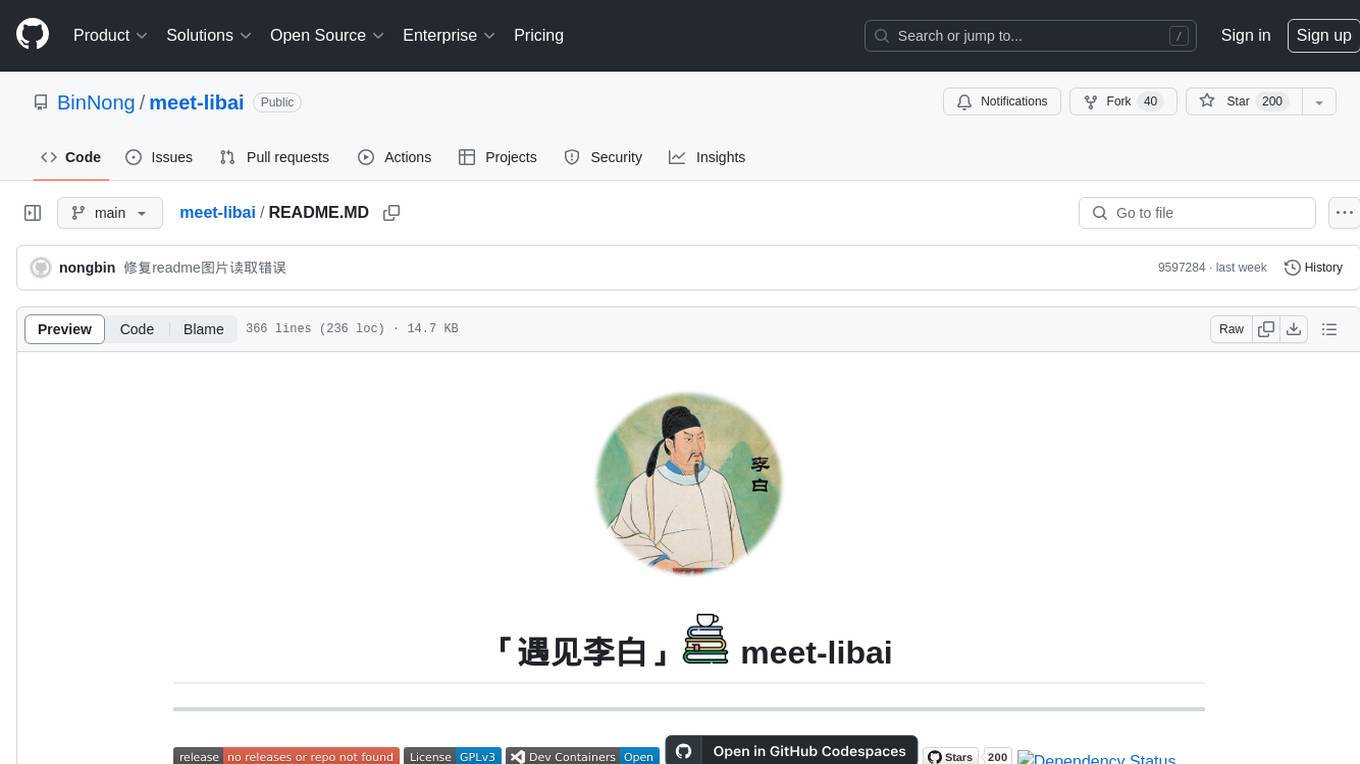
meet-libai
The 'meet-libai' project aims to promote and popularize the cultural heritage of the Chinese poet Li Bai by constructing a knowledge graph of Li Bai and training a professional AI intelligent body using large models. The project includes features such as data preprocessing, knowledge graph construction, question-answering system development, and visualization exploration of the graph structure. It also provides code implementations for large models and RAG retrieval enhancement.
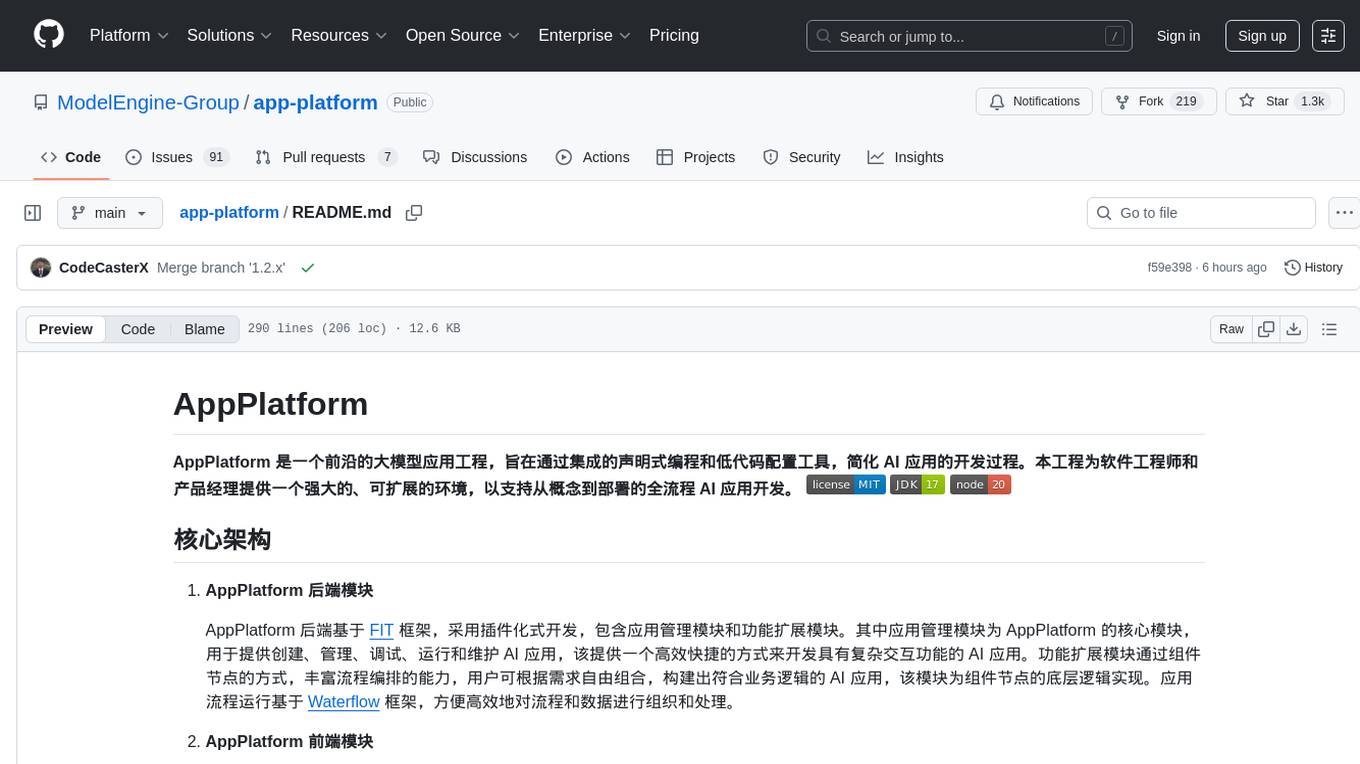
app-platform
AppPlatform is an advanced large-scale model application engineering aimed at simplifying the development process of AI applications through integrated declarative programming and low-code configuration tools. This project provides a powerful and scalable environment for software engineers and product managers to support the full-cycle development of AI applications from concept to deployment. The backend module is based on the FIT framework, utilizing a plugin-based development approach, including application management and feature extension modules. The frontend module is developed using React framework, focusing on core modules such as application development, application marketplace, intelligent forms, and plugin management. Key features include low-code graphical interface, powerful operators and scheduling platform, and sharing and collaboration capabilities. The project also provides detailed instructions for setting up and running both backend and frontend environments for development and testing.
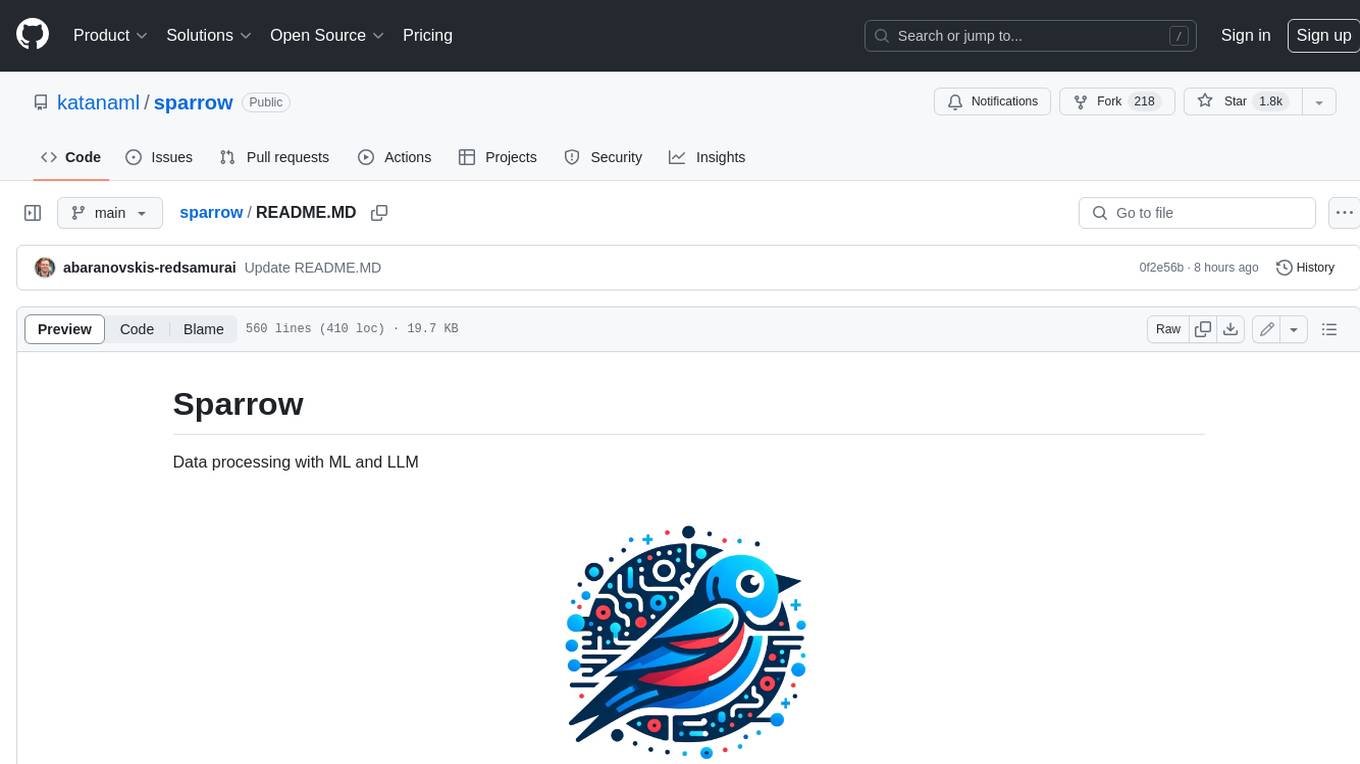
sparrow
Sparrow is an innovative open-source solution for efficient data extraction and processing from various documents and images. It seamlessly handles forms, invoices, receipts, and other unstructured data sources. Sparrow stands out with its modular architecture, offering independent services and pipelines all optimized for robust performance. One of the critical functionalities of Sparrow - pluggable architecture. You can easily integrate and run data extraction pipelines using tools and frameworks like LlamaIndex, Haystack, or Unstructured. Sparrow enables local LLM data extraction pipelines through Ollama or Apple MLX. With Sparrow solution you get API, which helps to process and transform your data into structured output, ready to be integrated with custom workflows. Sparrow Agents - with Sparrow you can build independent LLM agents, and use API to invoke them from your system. **List of available agents:** * **llamaindex** - RAG pipeline with LlamaIndex for PDF processing * **vllamaindex** - RAG pipeline with LLamaIndex multimodal for image processing * **vprocessor** - RAG pipeline with OCR and LlamaIndex for image processing * **haystack** - RAG pipeline with Haystack for PDF processing * **fcall** - Function call pipeline * **unstructured-light** - RAG pipeline with Unstructured and LangChain, supports PDF and image processing * **unstructured** - RAG pipeline with Weaviate vector DB query, Unstructured and LangChain, supports PDF and image processing * **instructor** - RAG pipeline with Unstructured and Instructor libraries, supports PDF and image processing. Works great for JSON response generation
For similar tasks

LLMStack
LLMStack is a no-code platform for building generative AI agents, workflows, and chatbots. It allows users to connect their own data, internal tools, and GPT-powered models without any coding experience. LLMStack can be deployed to the cloud or on-premise and can be accessed via HTTP API or triggered from Slack or Discord.

ai-guide
This guide is dedicated to Large Language Models (LLMs) that you can run on your home computer. It assumes your PC is a lower-end, non-gaming setup.

onnxruntime-genai
ONNX Runtime Generative AI is a library that provides the generative AI loop for ONNX models, including inference with ONNX Runtime, logits processing, search and sampling, and KV cache management. Users can call a high level `generate()` method, or run each iteration of the model in a loop. It supports greedy/beam search and TopP, TopK sampling to generate token sequences, has built in logits processing like repetition penalties, and allows for easy custom scoring.

jupyter-ai
Jupyter AI connects generative AI with Jupyter notebooks. It provides a user-friendly and powerful way to explore generative AI models in notebooks and improve your productivity in JupyterLab and the Jupyter Notebook. Specifically, Jupyter AI offers: * An `%%ai` magic that turns the Jupyter notebook into a reproducible generative AI playground. This works anywhere the IPython kernel runs (JupyterLab, Jupyter Notebook, Google Colab, Kaggle, VSCode, etc.). * A native chat UI in JupyterLab that enables you to work with generative AI as a conversational assistant. * Support for a wide range of generative model providers, including AI21, Anthropic, AWS, Cohere, Gemini, Hugging Face, NVIDIA, and OpenAI. * Local model support through GPT4All, enabling use of generative AI models on consumer grade machines with ease and privacy.

khoj
Khoj is an open-source, personal AI assistant that extends your capabilities by creating always-available AI agents. You can share your notes and documents to extend your digital brain, and your AI agents have access to the internet, allowing you to incorporate real-time information. Khoj is accessible on Desktop, Emacs, Obsidian, Web, and Whatsapp, and you can share PDF, markdown, org-mode, notion files, and GitHub repositories. You'll get fast, accurate semantic search on top of your docs, and your agents can create deeply personal images and understand your speech. Khoj is self-hostable and always will be.

langchain_dart
LangChain.dart is a Dart port of the popular LangChain Python framework created by Harrison Chase. LangChain provides a set of ready-to-use components for working with language models and a standard interface for chaining them together to formulate more advanced use cases (e.g. chatbots, Q&A with RAG, agents, summarization, extraction, etc.). The components can be grouped into a few core modules: * **Model I/O:** LangChain offers a unified API for interacting with various LLM providers (e.g. OpenAI, Google, Mistral, Ollama, etc.), allowing developers to switch between them with ease. Additionally, it provides tools for managing model inputs (prompt templates and example selectors) and parsing the resulting model outputs (output parsers). * **Retrieval:** assists in loading user data (via document loaders), transforming it (with text splitters), extracting its meaning (using embedding models), storing (in vector stores) and retrieving it (through retrievers) so that it can be used to ground the model's responses (i.e. Retrieval-Augmented Generation or RAG). * **Agents:** "bots" that leverage LLMs to make informed decisions about which available tools (such as web search, calculators, database lookup, etc.) to use to accomplish the designated task. The different components can be composed together using the LangChain Expression Language (LCEL).

danswer
Danswer is an open-source Gen-AI Chat and Unified Search tool that connects to your company's docs, apps, and people. It provides a Chat interface and plugs into any LLM of your choice. Danswer can be deployed anywhere and for any scale - on a laptop, on-premise, or to cloud. Since you own the deployment, your user data and chats are fully in your own control. Danswer is MIT licensed and designed to be modular and easily extensible. The system also comes fully ready for production usage with user authentication, role management (admin/basic users), chat persistence, and a UI for configuring Personas (AI Assistants) and their Prompts. Danswer also serves as a Unified Search across all common workplace tools such as Slack, Google Drive, Confluence, etc. By combining LLMs and team specific knowledge, Danswer becomes a subject matter expert for the team. Imagine ChatGPT if it had access to your team's unique knowledge! It enables questions such as "A customer wants feature X, is this already supported?" or "Where's the pull request for feature Y?"

infinity
Infinity is an AI-native database designed for LLM applications, providing incredibly fast full-text and vector search capabilities. It supports a wide range of data types, including vectors, full-text, and structured data, and offers a fused search feature that combines multiple embeddings and full text. Infinity is easy to use, with an intuitive Python API and a single-binary architecture that simplifies deployment. It achieves high performance, with 0.1 milliseconds query latency on million-scale vector datasets and up to 15K QPS.
For similar jobs

weave
Weave is a toolkit for developing Generative AI applications, built by Weights & Biases. With Weave, you can log and debug language model inputs, outputs, and traces; build rigorous, apples-to-apples evaluations for language model use cases; and organize all the information generated across the LLM workflow, from experimentation to evaluations to production. Weave aims to bring rigor, best-practices, and composability to the inherently experimental process of developing Generative AI software, without introducing cognitive overhead.

LLMStack
LLMStack is a no-code platform for building generative AI agents, workflows, and chatbots. It allows users to connect their own data, internal tools, and GPT-powered models without any coding experience. LLMStack can be deployed to the cloud or on-premise and can be accessed via HTTP API or triggered from Slack or Discord.

VisionCraft
The VisionCraft API is a free API for using over 100 different AI models. From images to sound.

kaito
Kaito is an operator that automates the AI/ML inference model deployment in a Kubernetes cluster. It manages large model files using container images, avoids tuning deployment parameters to fit GPU hardware by providing preset configurations, auto-provisions GPU nodes based on model requirements, and hosts large model images in the public Microsoft Container Registry (MCR) if the license allows. Using Kaito, the workflow of onboarding large AI inference models in Kubernetes is largely simplified.

PyRIT
PyRIT is an open access automation framework designed to empower security professionals and ML engineers to red team foundation models and their applications. It automates AI Red Teaming tasks to allow operators to focus on more complicated and time-consuming tasks and can also identify security harms such as misuse (e.g., malware generation, jailbreaking), and privacy harms (e.g., identity theft). The goal is to allow researchers to have a baseline of how well their model and entire inference pipeline is doing against different harm categories and to be able to compare that baseline to future iterations of their model. This allows them to have empirical data on how well their model is doing today, and detect any degradation of performance based on future improvements.

tabby
Tabby is a self-hosted AI coding assistant, offering an open-source and on-premises alternative to GitHub Copilot. It boasts several key features: * Self-contained, with no need for a DBMS or cloud service. * OpenAPI interface, easy to integrate with existing infrastructure (e.g Cloud IDE). * Supports consumer-grade GPUs.

spear
SPEAR (Simulator for Photorealistic Embodied AI Research) is a powerful tool for training embodied agents. It features 300 unique virtual indoor environments with 2,566 unique rooms and 17,234 unique objects that can be manipulated individually. Each environment is designed by a professional artist and features detailed geometry, photorealistic materials, and a unique floor plan and object layout. SPEAR is implemented as Unreal Engine assets and provides an OpenAI Gym interface for interacting with the environments via Python.

Magick
Magick is a groundbreaking visual AIDE (Artificial Intelligence Development Environment) for no-code data pipelines and multimodal agents. Magick can connect to other services and comes with nodes and templates well-suited for intelligent agents, chatbots, complex reasoning systems and realistic characters.



